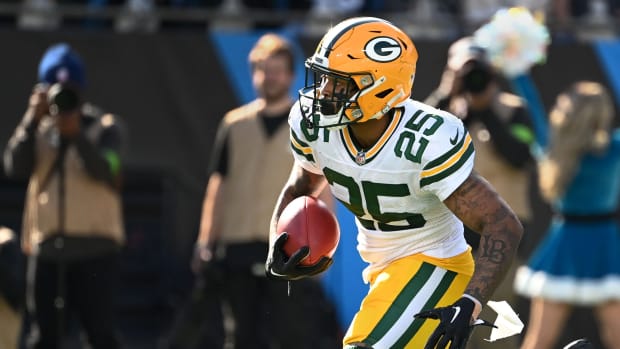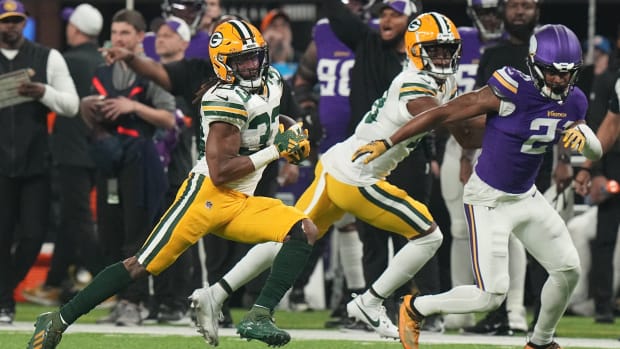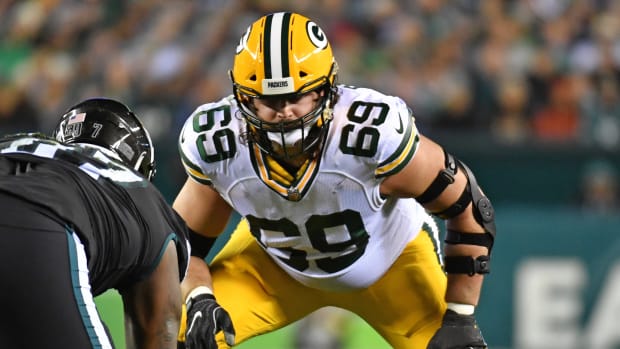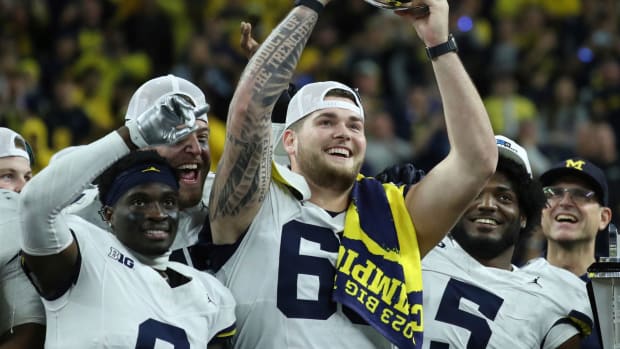When Locked In, Packers’ Defense Has Delivered
GREEN BAY, Wis. – The Green Bay Packers’ record-setting performance on offense the first two games – it ranks No. 1 in the NFL in scoring, total offense and rushing offense, among other key indicators – has created cautious optimism about what’s possible in Year 2 under coach Matt LaFleur.
The performance of coordinator Mike Pettine’s third-year defense, however, has led to consternation.
“The bottom line for us is it was well enough to win, but it has not been to our standards,” Pettine said on Thursday.
Much of the angst is centered on the final three drives of the Week 1 game against Minnesota and the first two drives of the Week 2 game against Detroit. Those five drives resulted in five touchdowns.
However, the other 16 drives tell a different story. The five consecutive scoring drives accumulated 367 yards of total offense. The other 16 drives totaled 322 yards and resulted in two touchdowns, one field goal, one missed field goal, seven punts, two turnovers, two turnovers on downs and one safety. In those 16 drives, the opponent scored 17 points while Green Bay’s defense scored nine.
The key from Pettine’s perspective hardly needs to be stated.
“Obviously, it’s great when we can make big plays and score points, but we have to raise our level of consistency,” he said. “Our offense is not going to be able to control the ball for 38 minutes a game all year. We need to be better, and it’s a lot of little things, early-season stuff that needs to get cleaned up. Hopefully, some of the mistakes that we’re making, they’re not going to repeat. It’s all been functions of different things.”
In those three game-ending touchdown drives against Minnesota, the defense took the field with three-score leads each time. The lack of killer instinct was worrisome but, ultimately, didn’t matter because the offense kept answering.
“Good teams are going to do what we did,” Pettine said. “We’re good, but we want to be great. That’s something where we get a team down and it’s on us to close it out, then we need to do it.”
Against Detroit, Pettine believed the defense was “too hyped” to start the game, which created too many mental breakdowns. But at least his unit slammed the door. After the opening two touchdowns, Detroit’s next six drives produced four first downs and reached Green Bay’s side of the field only once.
“I think the bulk of our [mental errors] came in the first two series and, obviously, it showed in the results,” Pettine said. “We just had to kind of get them calmed down. When we grade the tape, we track the mental errors. That’s a big part. We want to know if there’s a particular player. You can kind of evaluate yourself as a coach, too. If you have multiple guys at your position with the same mental error, it’s not on the players, it’s on the coaches. That’s why we test the guys each week, and if you get a question that’s missed by more than one, then obviously it wasn’t explained well enough. So, the mentals are something we take very seriously. I want to say we had a total of six or seven in the game, and I think five of them occurred in the first quarter.”
Those mental errors could be especially costly against a Hall of Fame-caliber quarterback such as the New Orleans Saints’ Drew Brees on Sunday night. Even with two interceptions, Green Bay is 22nd in opponent passer rating. Even with a focus on improving the run defense, Green Bay is 30th in yards allowed per carry.
“We’ve just got to be disciplined,” safety Adrian Amos said. “We’re figuring out our identity for this year. I’m big on you find that throughout the season. As you can see with the film on the flipside, when everybody is doing their job, when everybody’s accountable with what their job assignment is, then we’re pretty hard to beat.”




